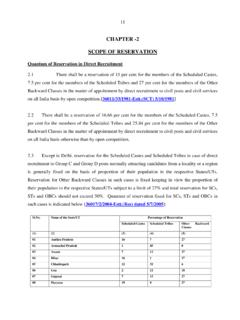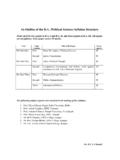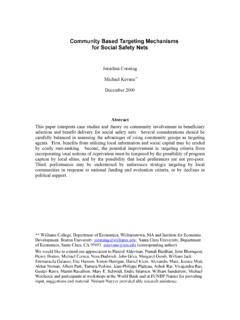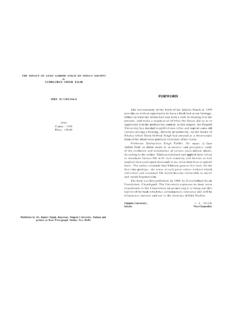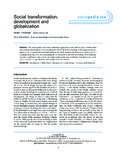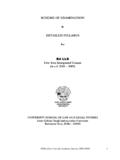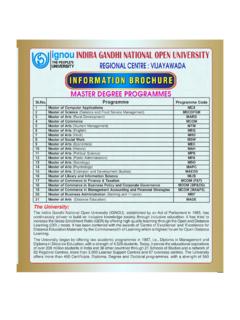Transcription of Module – 1 1 - Personnel Public Grievances & Pensions
1 Module 1 1 module 1 2 Reading Material Module I On Administrative Law WE ARE WHAT WE REPEATEDLY DO EXCELLENCE THAN IS NOT AN ACT, BUT A HABIT. Aristotle Module 1 3 CONTENTS Page Topic:Administrative Law-An Overview.
2 3-17 Issues and prospects *Introduction Concept, Definition scope and recent *trends in Administrative Law *Role of the Constitution and administrative Law, *Constitutional Provisions like Separation of Power 18-20 *Rule of Law and 21-25 *Droit Administrative. 26-28 Topic:Classification of Administrative Power 29-31 *Rules Making Power *Adjudicatory Power *Administrative Powers Delegated Legislation and its Control 32-43 *Delegated legislation, factors leading to delegated legislation *Restraints on delegation of legislative power *Control over delegated legislation.
3 Module 1 4 Administrative Law : Conceptual Analysis Issues and Prospects Introductory :- dministrative law is the bye-product of the growing socio-economic functions of the State and the increased powers of the government. Administrative law has become very necessary in the developed society, the relationship of the administrative authorities and the people have become very complex.
4 In order to regulate these complex, relations, some law is necessary, which may bring about regularity certainty and may check at the same time the misuse of powers vested in the administration. With the growth of the society, its complexity increased and thereby presenting new challenges to the administration we can have the appraisal of the same only when we make a comparative study of the duties of the administration in the ancient times with that of the modern times.
5 In the ancient society the functions of the state were very few the prominent among them being protection from foreign invasion, levying of Taxes and maintenance of internal peace & order. It does not mean, however that there was no administrative law before 20th century. In fact administration itself is concomitant of organized Administration. In India itself, administrative law can be traced to the well-organized administration under the Mauryas and Guptas, several centuries before the Christ, following through the administrative, system of Mughals to the administration under the East India Company, the precursor of the modern administrative system.
6 But in the modern society, the functions of the state are manifold, In fact, the modern state is regarded as the custodian of social welfare and consequently, there is not a single field of activity which is free from direct or indirect interference by the state. Along with duties, and powers the state has to shoulder new responsibilities. The growth in the range of responsibilities of the state thus ushered in an administrative age and an era of Administrative law.
7 The development of Administrative law is an inevitable necessity of the modern times; a study of administrative law acquaints us with those rules according to which the administration is to be carried on. Administrative Law A Module 1 5 has been characterized as the most outstanding legal development of the 20th-century. Administrative Law is that branch of the law, which is concerned, with the composition of powers, duties, rights and liabilities of the various organs of the Government.
8 The rapid growth of administrative Law in modern times is the direct result of the growth of administrative powers. The ruling gospel of the 19th century was Laissez faire which manifested itself in the theories of individualism, individual enterprise and self help. The philosophy envisages minimum government control, maximum free enterprise and contractual freedom. The state was characterized as the law and order state and its role was conceived to be negative as its internal extended primarily to defending the country from external aggression, maintaining law and order within the country dispensing justice to its subjects and collecting a few taxes to finance these activities.
9 It was era of free enterprise. The management of social and economic life was not regarded as government responsibility. But laissez faire doctrine resulted in human misery. It came to be realized that the bargaining position of every person was not equal and uncontrolled contractual freedom led to the exploitation of weaker sections by the stronger of the labour by the management in industries. On the one hand, slums, unhealthy and dangerous conditions of work, child labour wide spread poverty and exploitation of masses, but on the other hand, concentration of wealth in a few hands, became the order of the day.
10 It came to be recognized that the state should take active interest in ameliorating the conditions of poor. This approach gave rise to the favoured state intervention in and social control and regulation of individual enterprise. The state started to act in the interests of social justice; it assumed a positive role. In course of time, out of dogma of collectivism emerged the concept of social Welfare State which lays emphasis on the role of state as a vehicle of socio-economic regeneration and welfare of the people.
